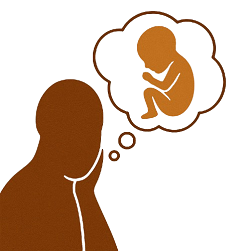The Desire to Have Children

The compatibility of family and science doesn’t start with the birth of a child, but rather with the first thoughts of starting a family - and in many cases with the desire to have children. With this website, we would like to provide you with information, counselling options and support services related to the desire to have children and family planning for students and employees of the university and draw attention to this demanding life situation in which many young academics find themselves and promote understanding for this.
In the early career stages, childlessness is relatively high and according to BuWiK 2025 the percentage of parents among the PhD students at German universities is 13%. In the later career stages, the number rises to over 50%, whereby it should be noted that the proportion of mothers among the female academics is lower than that of fathers among the male academics. Among professors, the percentage of parents is higher - with a significant difference between the genders (76% for men, 59% for women). (BuWik 2025, p.208)
Many of the childless scientists have a desire to have children that has not (yet) been fulfilled. For those who are involuntarily childless, there are various reasons why the desire to have children has not yet been fulfilled. In addition to the physical reasons of a (temporary) fertility disorder, psychological stress can also play a major role, which in our academic system is also related to structural conditions. In an interview with the Federal Ministry of Education and Research, Dr Inken Lind describes the results of her study as follows: "In addition to financial fears, many fear that they will no longer be competitive and that their prospects of finding a good job will be minimised. The pressure to excel and compete at universities is immense. Profiling oneself is largely based on publications , the more they publish and the more international they are, the better for their career. In addition, they fear that they will be assumed to be less capable, which unfortunately often happens. There are major reservations within the university about employees who have parental responsibilities." (Children - Desire and Reality in Science. Research results and consequences. BMBF, 2010) As real-life experience shows, some of these findings are still relevant today. More than half of childless PhD students cite a lack of work-life balance and career insecurity as difficulties in planning a family (cf. BuWiK 2025, p. 210). This is often due to fixed-term contracts.
If a person/couple decides to fulfil their desire to have children, they turn to specialists - the first step is to see a specialist (gynaecologist), where the reproductive medical treatment begins. This is often a considerable burden for those affected, not only financially, but also physically and emotionally.
The Office of the University Women's Representative strives to improve the work-related structural conditions by offering counselling and information for all scientists as well as through support and policy work in various committees. In addition, we have founded a local group of the ‘Motherhood and Science’ network, in which people who wish to have children are already participating and others are very welcome. Please feel free to contact us if you have any questions on this topic. We will be happy to advise you and, if necessary, direct you to suitable contact points. If you have any questions, please contact us at vereinbarkeit@uni-wuerzburg.de.
Below you can find advice centres specialising in this topic, both in Würzburg and nationwide, as well as further information:
Our counselling services at a glance:
Counselling services
The desire to have children can trigger many emotions - hope, joy, but also uncertainty or doubt. Regardless of whether you are at the beginning of your journey, would like medical or psychological guidance or you are already pregnant and facing challenges: You are not alone.
There are numerous counselling centres that will support you in every situation - confidentially and according to your needs.
Nationwide counselling services
In addition to the support services in Würzburg, here you can find an overview of nationwide and regional contact points.
Counselling centres in Bavaria and Germany
Especially difficult situations
Miscarriage
Pregnancy does not always proceed smoothly and complications or even termination may occur. For example, around 10-15% of all confirmed pregnancies in Germany end in miscarriage within the first twelve weeks. You can find help for this and other difficult situations at the pregnancy counselling centres (listed above) and on the helpful information pages below:
- Universitätsklinikum Würzburg: Frauenklinik: Wiederholte Fehlgeburten
- BMFSFJ - Gestaffelter Mutterschutz bei Fehlgeburten in Kraft getreten
- donum vitae hilft durch die Zeit der Trauer um das Kind - donum vitae
- Glücklose Schwangerschaft
- Ein Kind früh verlieren - familienplanung.de
Sources:
- Frauenärzte im Netz - Ungewollt kinderlos & Fruchtbarkeitsstörungen
- BMFSFJ-Hilfe und Unterstützung bei ungewollter Kinderlosigkeit
- Kinder – Wunsch und Wirklichkeit in der Wissenschaft
- Media Library - BuWiK 2025



